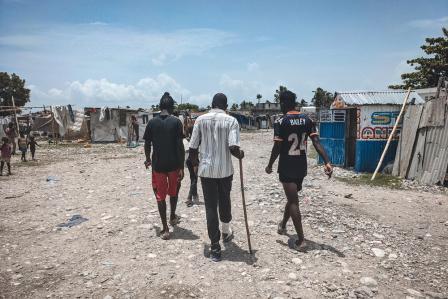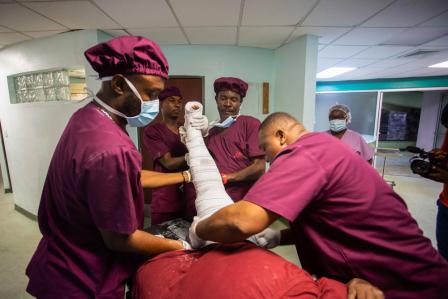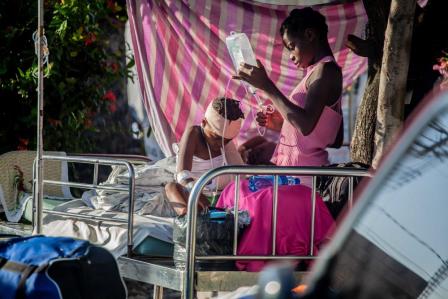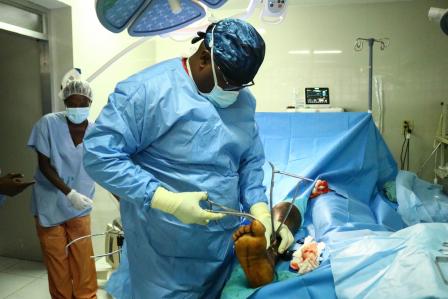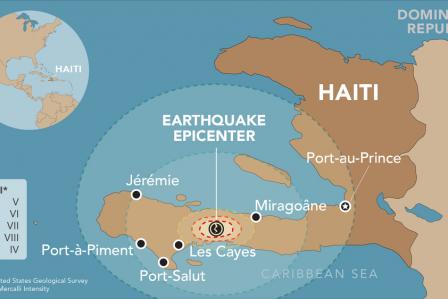Haiti Earthquake
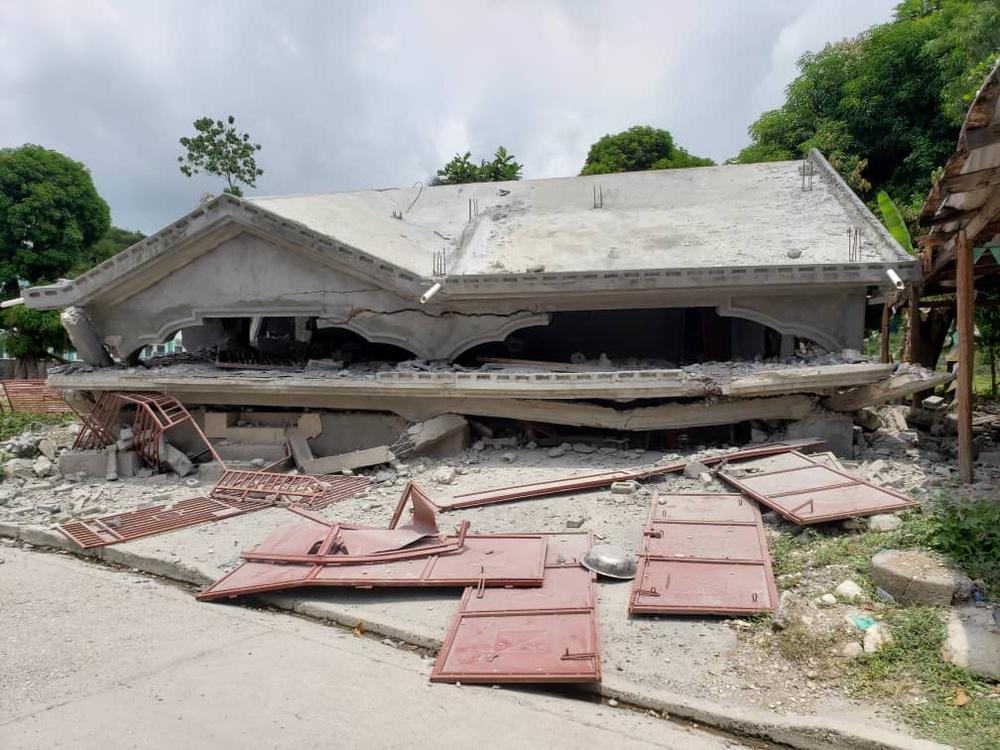
A house destroyed by the earthquake on the morning of August 14 near the MSF sexual and reproductive health project in Port-à-Piment, in Haiti's Sud department. © Souchet Hippolyte/MSF
The provisional death toll is at least 724, according to Haiti’s Office for Civil Protection, and more than 2800 people have been injured (as of August 15). These figures are only temporary and are expected to change in the coming hours/days, as many municipalities in the affected areas remain isolated from the rest of the country.
In terms of buildings, 7,369 houses were destroyed and 4,852 houses damaged in the 3 most affected provinces (Sud, Grand ’Anse and Nippes) according to Haiti’s Office for Civil Protection (as of August 15). Many public buildings (hospitals, schools, hotels, churches, private companies, etc.) suffered damage or collapsed. Some hospitals had to evacuate their patients. Some facilities are overwhelmed and experiencing a lack of medical equipment and medicines.
Since August 14, Haiti has experienced aftershocks and landslides, causing additional damage.
An added reason for concern is the impending arrival of tropical storm Grace, which is expected to hit Haiti on Monday, August 16, 2021. Weather data predict 10 to 18 cm of rain on the island, reaching up to 25 centimeters in some places. The Sud-Est province and the three provinces affected most by the earthquake are in the path of the storm.
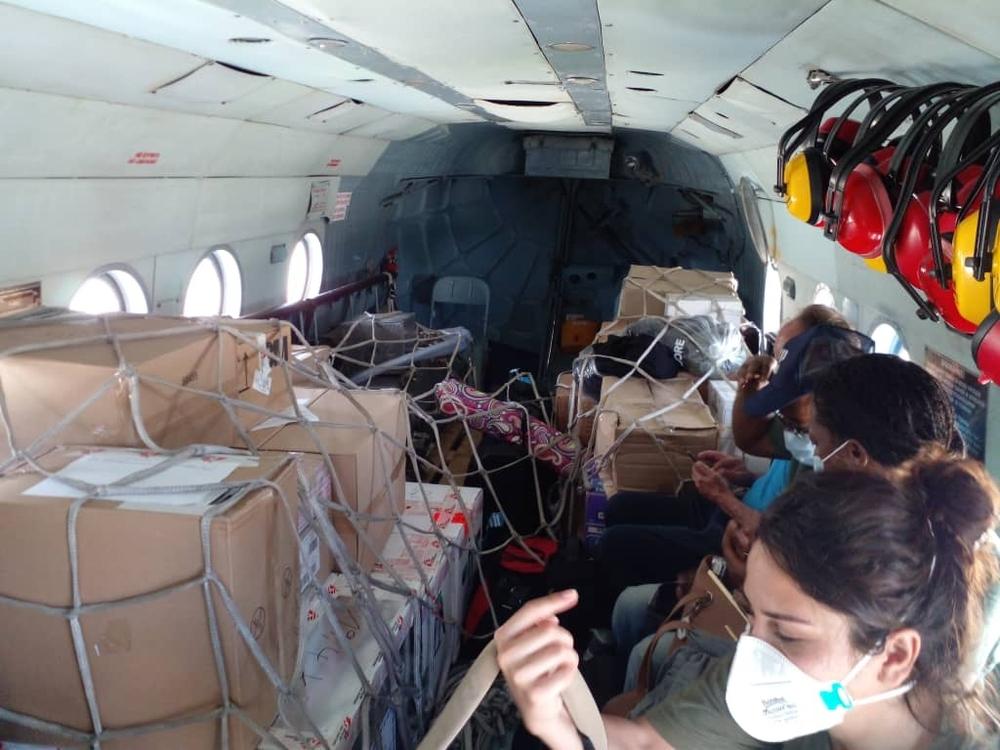
An MSF emergency team travels from Port-au-Prince to Grand Anse in helicopter with medical and humanitarian supplies. © MSF
MSF's response in Grand Anse, Nippes, and Sud provinces
In the first hours after the earthquake, the MSF team based in Port-à-Piment and an emergency medical team from Port-au-Prince began assisting injured patients in Sud province. The hospital in Port-à-Piment where MSF provides sexual and reproductive health care was damaged. The patients, most of whom were receiving maternal health care, were evacuated to a tent where the MSF team continues to provide care. In Port-à-Piment, MSF is also stabilizing patients injured by the earthquake.
In Port-Salut, an MSF team received at least 16 patients with injuries and fractures, including patients referred from Port-à-Piment and Les Cayes. MSF and its partners are stabilizing the wounded and providing surgical and follow-up care.
In Les Cayes, an MSF team is providing medical supplies and staff to work in the general hospital.
An MSF team is assessing needs in the more remote location of Les Anglais and has been transporting patients from Les Anglais to Port-a-Piment and other areas. Vehicles are unable to travel the entire way to Les Anglais at the moment so patients must be shuttled between two different vehicles, making the trip especially difficult.
An MSF team arrived on August 15 in Nippes, and visited the Sainte-Thérèse hospital in Miragane, which has received 59 wounded. MSF donated supplies to the hospital and an MSF surgeon and nurse are providing medical support. Another team is assessing the situation in Baradères and Petit Trou in Nippes, which have reportedly been seriously affected.
MSF also sent emergency supplies from Port-au-Prince to Sud (first aid kits, tents for emergency clinics, medicines and supplies for blood transfusions and plaster casts). Some access routes, such as the road between Les Cayes and Jérémie, are seriously damaged, and complicate the deployment of aid. However, an MSF team, including two surgeons and an operating room nurse, brought medical supplies to Jeremie on August 15 and began working in the town's hospital.
MSF plans to reinforce its activities in the coming days, sending more medical teams, including surgeons. MSF is preparing to send medical and emergency supplies from abroad, including two cargo planes from Brussels.
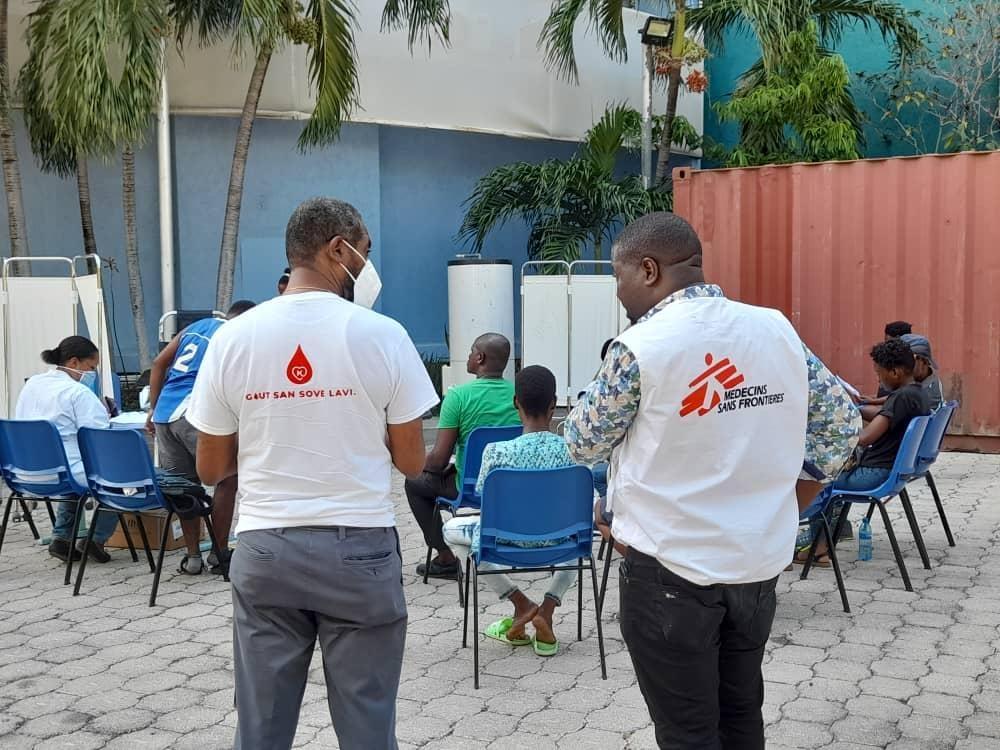
Volunteers quickly responded to MSF's call for blood donations on Aug. 14 to help those injured in the earthquake that has primarily affected Haiti's southern departments. © MSF
In Port-au-Prince
MSF is treating injured people in its trauma hospital in Tabarre. On August 14, six injured people from the south were admitted to this facility.
To address potential blood shortages, MSF launched a blood collection campaign in the Turgeau neighborhood of Port-au-Prince on August 14, in partnership with local authorities. On August 15, MSF opened an emergency center in the Turgeau neighborhood and began providing stabilization care to injured patients.
MSF has been present in Haiti for 30 years. Our regular activities continue, including at the Tabarre hospital in Port-au-Prince, where MSF is treating severely burned patients as well as people with life-threatening injuries. MSF also provides maternal and sexual and reproductive health care in Port-a-Piment in Haiti's Sud province and treats victims of sexual and gender-based violence in Port-au-Prince and Gonaïves. After more than 15 years, MSF was forced to close its emergency center in Martissant, Port-au-Prince, after an armed group fired on the facility on June 26, putting medical staff and patients at risk. Earlier in the year, MSF was forced to relocate its burns hospital from Drouillard to Tabarre due to insecurity.
